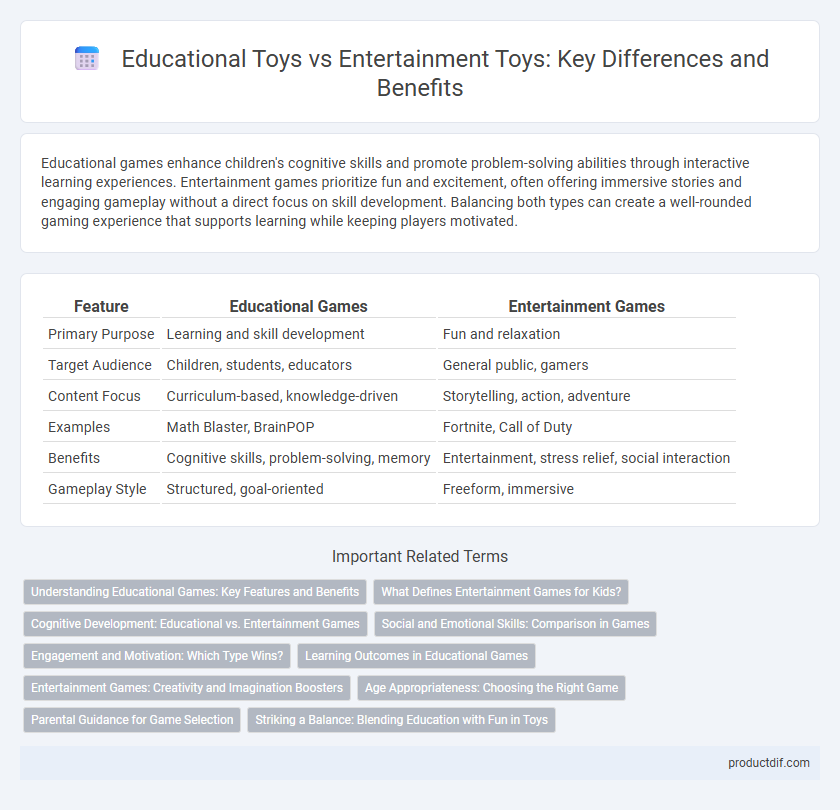Educational games enhance children's cognitive skills and promote problem-solving abilities through interactive learning experiences. Entertainment games prioritize fun and excitement, often offering immersive stories and engaging gameplay without a direct focus on skill development. Balancing both types can create a well-rounded gaming experience that supports learning while keeping players motivated.
Table of Comparison
| Feature | Educational Games | Entertainment Games |
|---|---|---|
| Primary Purpose | Learning and skill development | Fun and relaxation |
| Target Audience | Children, students, educators | General public, gamers |
| Content Focus | Curriculum-based, knowledge-driven | Storytelling, action, adventure |
| Examples | Math Blaster, BrainPOP | Fortnite, Call of Duty |
| Benefits | Cognitive skills, problem-solving, memory | Entertainment, stress relief, social interaction |
| Gameplay Style | Structured, goal-oriented | Freeform, immersive |
Understanding Educational Games: Key Features and Benefits
Educational games emphasize cognitive development and skill acquisition through interactive learning, integrating curriculum-based content and adaptive difficulty levels. These games promote critical thinking, problem-solving, and memory enhancement by engaging players in tasks that require strategic planning and knowledge application. Research shows that educational games can improve retention rates and motivation in children, making learning enjoyable and effective compared to traditional methods.
What Defines Entertainment Games for Kids?
Entertainment games for kids prioritize fun, engagement, and imaginative play, often featuring colorful graphics, simple controls, and interactive storylines designed to captivate attention. These games emphasize instant gratification and social interaction, fostering creativity and relaxation without stringent learning objectives. Their main goal is to provide an enjoyable experience that stimulates curiosity and laughter, distinguishing them from educational games that focus on cognitive development and skill-building.
Cognitive Development: Educational vs. Entertainment Games
Educational games are specifically designed to enhance cognitive development by promoting critical thinking, problem-solving, and memory skills through interactive learning experiences. Entertainment games, while engaging and often challenging, primarily focus on fun and social interaction, offering limited direct cognitive development benefits. Studies show that educational games improve knowledge retention and analytical skills more effectively than entertainment games due to their structured content and pedagogical approach.
Social and Emotional Skills: Comparison in Games
Educational games enhance social and emotional skills by promoting collaboration, empathy, and problem-solving through interactive scenarios designed for learning. Entertainment games often emphasize competition and individual achievement, which can foster motivation but may limit opportunities for developing emotional intelligence and cooperative behaviors. Research indicates that integrating social-emotional learning elements in educational games leads to more effective skill acquisition compared to entertainment-focused gaming experiences.
Engagement and Motivation: Which Type Wins?
Educational games foster deep engagement by integrating learning objectives with interactive challenges, effectively motivating players through goal-oriented tasks and progress feedback. Entertainment games captivate users primarily through immersive narratives and dynamic gameplay, sparking intrinsic motivation tied to fun and exploration. Studies show educational games often achieve higher sustained motivation when designed with adaptive difficulty and clear rewards tied to skill development.
Learning Outcomes in Educational Games
Educational games are designed to enhance cognitive skills, problem-solving abilities, and knowledge retention through interactive and engaging content. Studies indicate that these games improve learning outcomes by providing immediate feedback, promoting critical thinking, and adapting to individual learning paces. Unlike entertainment games, educational games align gameplay with curriculum goals, making them effective tools for formal and informal education settings.
Entertainment Games: Creativity and Imagination Boosters
Entertainment games stimulate creativity and imagination by providing open-ended scenarios that encourage players to explore diverse narratives and problem-solving strategies. Unlike educational games that follow structured learning objectives, these games often feature rich storytelling, immersive environments, and customizable elements that enable personalized creative expression. Popular titles such as Minecraft and LittleBigPlanet highlight how entertainment games foster innovative thinking and artistic skills through interactive play.
Age Appropriateness: Choosing the Right Game
Age appropriateness is crucial when selecting educational games and entertainment games, as younger children benefit from games designed to develop cognitive and motor skills, while older kids require more complex challenges tailored to their developmental stage. Educational games often align with specific learning goals and curricula, making them suitable for targeted age groups, whereas entertainment games focus on engagement and fun, sometimes requiring maturity to understand themes or controls. Ensuring the game matches the child's age enhances learning outcomes in educational games and prevents frustration or disengagement in entertainment games.
Parental Guidance for Game Selection
Parental guidance is crucial in selecting educational games that promote cognitive development and skill-building over purely entertainment-focused games designed primarily for amusement. Educational games often incorporate curriculum-aligned content that enhances learning outcomes in subjects like math, science, and language arts. Parents should evaluate game ratings, content quality, and the balance between fun and educational value to ensure a positive impact on their child's growth.
Striking a Balance: Blending Education with Fun in Toys
Educational games enhance cognitive development and problem-solving skills, while entertainment games boost creativity and relaxation, creating a powerful synergy in toy design. Integrating interactive storytelling with skill-building challenges ensures children remain engaged while learning essential concepts. Striking a balance involves using age-appropriate content, immersive technology, and rewarding gameplay to foster both knowledge acquisition and enjoyment.
Educational Games vs Entertainment Games Infographic

 productdif.com
productdif.com